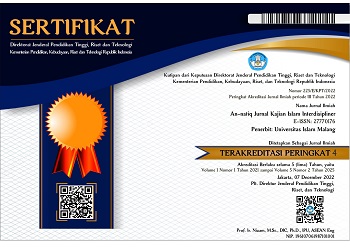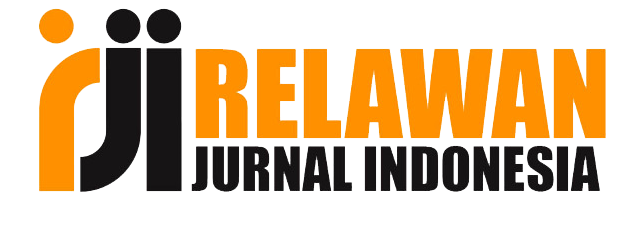IMPLEMENTASI SYARAT-SYARAT MUFASSIR DI ERA DIGITAL
DOI:
https://doi.org/10.33474/an-natiq.v1i2.11522Keywords:
Interpretation, Mufassir requirements, Digital ageAbstract
The mufassir terms are a set of rules or ethics codes for those who want to interpret the content of the Qur'an. These requirements relate to a person's personality and the ruler of scientific disciplines, especially interpretation. The presence of digital technology today makes the study of performance develop so rapidly because the study of understanding is no longer through studies, discussions, halaqah, and recitations in mosques but turns into a digital era. Moreover, this paper explained implementing mufassir requirements in the digital age, whether these conditions be applied in the digital era or are the opposite. In this paper, the writer used descriptive analysis using library data. The results showed that implementing the mufassir requirements in this digital era is the same as the qualifications for the mufassir requirements formulated by scholars in general, plus the ability to be technologically literate, including digital technology.
Â
Â
References
Alfurqon, (2011) “Kaidah Kualifikasi Intelektual Mufasir dan Urgensinyaâ€, Muttawatir: Jurnal Keilmuan Tafsir Hadis Vol. 1 No. 2. (Desember).
al-Qattan, Manna> Khalil. (1973). Ma>ba>his fi> Ulu>m Alqura>n. Beirut: Masyurat al-Ashr al-Hadi>s.
al-Qattan, Manna> Khalil. (2011) Studi Ilmu-Ilmu Alquran, Terj. Mudzakir, cet 14. Bogor: Pustaka Lintera Antar Nusa.
al-Su>yuti, Jalal al-Di>n. (1318). al-Itqa>n fi> ‘Ulu>m al-Qura>n. Mesir: al-Azhar.
al-Zarkasi, Badr al-Di>n. (1957). al-Burha>n fi> ‘Ulum al-Qura>n. Mesir: al-Halabi.
Amin Suma, Muhammad. (2013). Ulumul Quran. Jakarta: PT Raja Grafindo Persada.
Arni, Jani. (2013). Metodologi Penelitian Tafsir. Pekanbaru: Daulat Riau.
Firdiyanti, Afrida. (2018). Implementasi Manajemen Berbasis Sekolah. Yogyakarta: CV Gre Publising.
Kementerian Agama RI, (2017). Alquran dan Terjemahnya. MQ Tebu Ireng.
M Fajar Mubarok dkk. (2021). “Digitalisasi Alquran dan Tafsir Media Sosial di Indonesia, Journal Iman dan Spiritualis, Vol 1 No 1. (Januari-Maret).
Quraish Shihab, Muhammad. (2013). Kaidah Tafsir. Tanggerang: Lentera Hati, 2013.
Quraish Shihab, Muhammad. (1998). Membumikan Alquran; Fungsi dan Peran Wahyu dalam Kehidupan Masyarakat. Bandung: Penerbit Mizan.
Rifai, Ahmad. (2020). “Tafsir Web; Digitalization Of Quranic Interpretation And Democration Of Religious Scour In Indonesiaâ€, Jurnal At-Tibyan Ilmu Alquran dan Tafsir Vol 5 No 2, (Desember).
Setiawan, Wawan. (2017). “Era Digital dan Tantanganya, Seminar Nasional Pendidikanâ€, eprints.ummi.ac.id.
Shihab, M. Quraish. (2017). Tafsir Al-Misbah; Pesan, Kesan, dan Keserasian Alquran cet 1. Ciputat: Penerbit Mizan.
Tolchah, Moch. (2016). Aneka Pengkajian Studi Alquran. Yogyakarta: LKIS Pelangi Aksara.


























